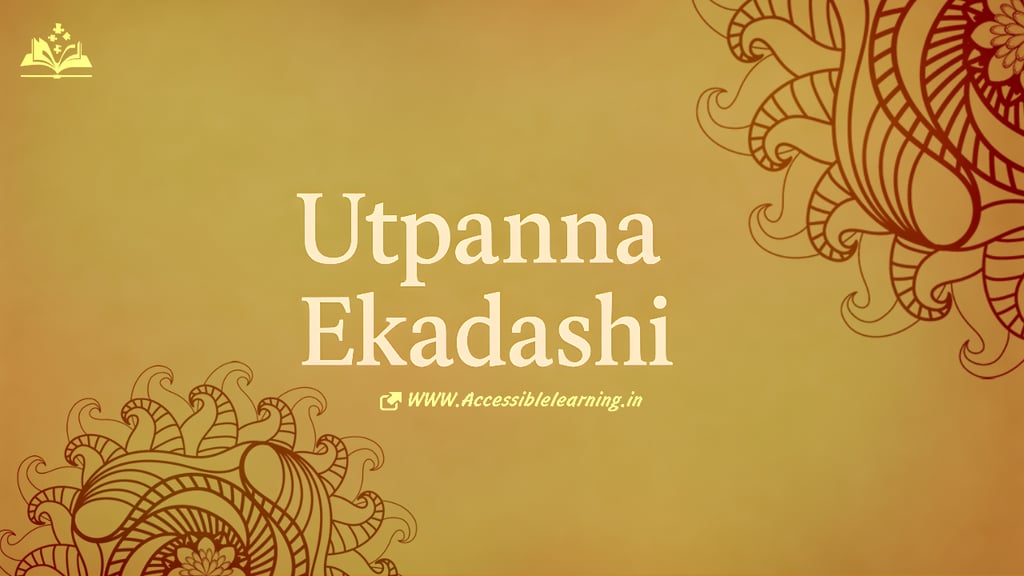
The Sacred Beginning: Understanding the Meaning of Utpanna Ekadashi
Utpanna Ekadashi marks the birth of Mother Ekadashi, the divine power of Vishnu Ji, symbolizing the victory of light over darkness. Celebrated on the eleventh day of Krishna Paksha in Margashirsha, this sacred day teaches spiritual awakening, discipline, and devotion. Discover its origin, story, rituals, significance, and why it’s known as the first and most powerful Ekadashi of the Hindu year.
CULTURE/TRADITIONINDIA/BHARATCELEBRATION/FESTIVALS
Sachin Tiwari
11/6/20257 min read


Utpanna Ekadashi, also known as Utpatti Ekadashi, is one of the most sacred fasting days in Hinduism. It falls on the 11th day (Ekadashi) of the Krishna Paksha (waning moon) in the month of Margashirsha (November–December).
This Ekadashi is unique because it celebrates the origin of all Ekadashis and marks the birth of Maa Ekadashi, a divine power created by Vishnu Ji. Devotees believe that observing Utpanna Ekadashi cleanses one’s heart, mind, and soul and begins a spiritual journey toward liberation.
It is often said that those who start their Ekadashi vrat cycle from Utpanna Ekadashi receive greater spiritual benefits, as it symbolizes a new beginning of faith and self-discipline.
The Divine Story Behind Utpanna Ekadashi
The story of Utpanna Ekadashi is deeply rooted in the Bhavishya Purana and Padma Purana.
Long ago, a demon named Mur became extremely powerful. His strength and cruelty spread fear across the heavens and earth. The gods, unable to defeat him, sought the help of Vishnu Ji.
Vishnu Ji engaged in a fierce battle with Mur that lasted for thousands of celestial years. After the long fight, Vishnu felt the need to rest and entered a deep sleep in a cave at Badrikashrama. Taking advantage of this, the demon Mur tried to attack the sleeping Lord.
But before he could strike, a radiant feminine energy emerged from Vishnu’s body, a divine being glowing with immense spiritual power. She fought Mur and destroyed him instantly.
When Vishnu Ji awoke, he was pleased to see the demon defeated. He blessed the divine energy, saying,
“You were born on the eleventh day (Ekadashi) of the lunar cycle. You shall be worshipped by all beings, and those who observe your day with devotion shall be freed from sins and ignorance.”
Thus, Maa Ekadashi was born, the embodiment of purity, awareness, and self-control and this day became known as Utpanna Ekadashi.
The Symbolic Meaning of Utpanna Ekadashi
Every aspect of this Ekadashi carries deep symbolic importance:
Victory Over Ignorance: The demon Mur represents inner darkness, desires, and uncontrolled impulses. The birth of Maa Ekadashi symbolizes awakening the rise of divine consciousness that conquers the mind’s lower tendencies.
The Beginning of Discipline: As the first Ekadashi, it signifies the start of spiritual discipline and faith. It marks the path toward balance, detachment, and mindfulness.
The Divine Feminine Power: Mother Ekadashi embodies Shakti, the force of creation and transformation. Her birth reminds us that spiritual strength often takes the form of awareness, not aggression.
The Role of Fasting: Fasting on this day is symbolic of inner purification controlling desires, practicing restraint, and detaching from material indulgence.
Utpanna Ekadashi thus represents a rebirth of the soul, inviting the devotee to live consciously, guided by divine wisdom.
Rituals and Observances of Utpanna Ekadashi
The observance of Utpanna Ekadashi follows a sequence of rituals that emphasize discipline, purity, and devotion.
The Day Before Ekadashi (Dashami)
Devotees eat a light, sattvic meal before sunset and avoid heavy or non-vegetarian food.
It’s believed that cleansing the body and thoughts on Dashami prepares one for the fast ahead.
The Ekadashi Fast
The fast begins at sunrise and continues until the next day’s sunrise (Dwadashi).
Some observe a Nirjala Vrat (complete fast without water), while others consume fruits, milk, nuts, or water.
Grains, pulses, rice, onion, and garlic are strictly avoided.
Morning Rituals
Wake up before sunrise during Brahma Muhurta and take a purifying bath.
Offer prayers to Vishnu Ji, lighting a lamp and offering tulsi leaves, flowers, and incense.
Chant Vishnu mantras such as “Om Namo Bhagavate Vasudevaya.”
Devotional Practices
Devotees read the Ekadashi Mahatmya and listen to the story of Utpanna Ekadashi.
Singing bhajans, reciting Vishnu Sahasranama, or meditating on Vishnu Ji are common practices.
Many devotees stay awake the entire night, chanting and meditating to keep their minds focused.
Parana (Breaking the Fast)
The fast is broken the next morning (Dwadashi) after offering food to Vishnu Ji and seeking His blessings.
The meal taken after the fast is simple, sattvic, and consumed with gratitude.

The Spiritual Benefits of Observing Utpanna Ekadashi
The practice of fasting on Utpanna Ekadashi is more than a ritual; it’s a spiritual discipline that transforms one’s consciousness.
Purification of Mind and Body: The fast detoxifies the body and clears the mind, helping one feel light and focused.
Freedom from Karma: Scriptures state that those who observe this fast sincerely are freed from past sins and negative karma.
Strengthening Self-Control: Fasting strengthens willpower, teaching restraint and balance.
Mental Peace: By detaching from material cravings, one experiences calmness and clarity.
Path to Liberation: It’s said that the observer of Utpanna Ekadashi finds the path toward moksha (spiritual liberation) illuminated by Vishnu Ji’s grace.
Energy Renewal: Spiritually, this day symbolizes renewal, a time to restart one’s journey with awareness and divine support.
Regional and Cultural Observances
Utpanna Ekadashi is celebrated across India and Nepal with variations in rituals but a shared essence of devotion to Vishnu.
In North India, devotees perform Vishnu Puja at home and visit temples to offer prayers. Temples often conduct bhajan sandhya and kirtan sessions through the night.
In South India, the day is observed as part of Vaishnava traditions. Temples of Vishnu, Krishna, and Venkateshwara organize special poojas and community fasting.
In Maharashtra and Gujarat, devotees also perform daan (charity) by offering food, clothes, or donations to the needy, signifying humility and service.
In Nepal, Utpanna Ekadashi marks the start of the winter fasting cycle, with devotees visiting Vishnu temples such as Changu Narayan and Budhanilkantha.
The observance of this day bridges communities, reminding everyone of the shared spiritual goal to live a life of compassion, discipline, and awareness.
Lessons and Spiritual Insights
Utpanna Ekadashi carries timeless lessons that go beyond religion or ritual:
Spiritual strength lies in awareness, not aggression.
Every soul has the power to rise above inner demons.
Discipline and devotion open the door to peace and wisdom.
Purity of thought is the highest form of worship.
Renewal begins when the heart turns inward toward divinity.
The celebration of Utpanna Ekadashi reminds us that every human being can awaken divine consciousness within, just as Maa Ekadashi emerged from Vishnu radiant, pure, and fearless.
Utpanna Ekadashi is not merely a day of fasting; it’s the awakening of inner light. It marks the birth of divine awareness that dispels ignorance, weakness, and ego.
By observing this Ekadashi with devotion and sincerity, one begins a new chapter of spiritual growth, one guided by discipline, clarity, and surrender to the divine.
The message of Utpanna Ekadashi is simple yet profound:
“Awaken the divine within. Conquer the darkness through awareness. Let devotion be your path to peace.”

FAQs
Q: What is Utpanna Ekadashi, and why is it celebrated?
Utpanna Ekadashi is the first Ekadashi of the Hindu lunar calendar, celebrated to honor the birth of Mother Ekadashi, who emerged from Vishnu Ji to destroy the demon Mur. It signifies the victory of good over evil, spiritual awakening, and the beginning of devotion and self-discipline.
Q: When is Utpanna Ekadashi observed?
Utpanna Ekadashi falls on the 11th day (Ekadashi Tithi) of the Krishna Paksha (waning phase of the moon) in the Hindu month of Margashirsha, which usually corresponds to November or early December in the Gregorian calendar. The exact date changes every year according to the lunar calendar.
Q: What is the spiritual importance of Utpanna Ekadashi?
Spiritually, Utpanna Ekadashi represents the awakening of divine consciousness. Observing this fast helps devotees cleanse their mind, body, and soul, overcome negative karma, and move closer to attaining moksha (liberation). It’s believed that this Ekadashi opens the doorway to higher awareness and inner peace.
Q: Who should observe the Utpanna Ekadashi fast?
Anyone with faith and devotion toward Vishnu Ji can observe the fast. It is suitable for both men and women, regardless of age. Those who cannot fast completely can take fruits, milk, or light sattvic food while maintaining a spiritual mindset throughout the day.
Q: What are the main rules and restrictions of the fast?
Avoid all grains, pulses, beans, rice, and non-vegetarian food.
Abstain from onion, garlic, and alcohol.
Focus on prayers, meditation, and self-reflection.
Speak truthfully, avoid anger, and maintain inner calm.
Break the fast (Parana) the next morning after offering food to Lord Vishnu.
Q: What are the benefits of observing Utpanna Ekadashi?
The Utpanna Ekadashi fast offers both spiritual and physical benefits:
Cleanses the mind and heart of negativity
Strengthens willpower and concentration
Reduces attachment to material desires
Promotes health and emotional balance
Helps one attain divine blessings and peace of mind
Q: What is the connection between Utpanna Ekadashi and other Ekadashis?
Utpanna Ekadashi is regarded as the origin of all Ekadashis. According to scriptures, after Mother Ekadashi was born, Vishnu Ji declared that fasting on this day and on all future Ekadashis would help humanity overcome sins and ignorance. It’s the foundation of the entire Ekadashi vrat tradition.
Q: Can people who are sick or elderly observe this Ekadashi?
Yes, but with modifications. Those who are ill, elderly, or physically weak can perform a partial fast, consuming fruits, milk, or light vegetarian food while keeping their thoughts focused on devotion and purity. The key is sincerity, not strictness.
Q: What should devotees do on the night of Utpanna Ekadashi?
Many devotees stay awake through the night, performing bhajans, kirtans, or Vishnu chants. Keeping vigil is symbolic of spiritual alertness, staying conscious against the ‘sleep of ignorance.’ It’s also believed to multiply the merits of the fast.
Q: What makes Utpanna Ekadashi different from other Ekadashis?
Unlike other Ekadashis that focus on purification or specific blessings, Utpanna Ekadashi is the source of all Ekadashis and honors the divine birth of Ekadashi Devi herself. It is the starting point of the Ekadashi vrat cycle and is considered highly auspicious for beginning spiritual practices.
Q: Is charity or donation important on Utpanna Ekadashi?
Yes. Giving daan (charity) is an essential part of this day. Devotees donate food, clothes, or money to the poor, which symbolizes humility, compassion, and detachment from material possessions. It’s believed that charity done on Ekadashi brings lasting spiritual merit.
Q: How can one prepare for Utpanna Ekadashi?
Preparation begins a day earlier by eating light food on Dashami, avoiding indulgence, and setting intentions for self-purification. Mentally preparing for calmness, forgiveness, and spiritual focus ensures that the fast becomes a meaningful and peaceful experience.
Q: What is the significance of breaking the fast (Parana) properly?
The Parana is performed the next morning after worshipping Vishnu Ji. Breaking the fast with gratitude and simplicity signifies the return to worldly life with renewed awareness. Improperly breaking the fast, or delaying it unnecessarily, is said to reduce the spiritual benefits.
Q: What message does Utpanna Ekadashi convey to devotees?
Utpanna Ekadashi teaches that true victory lies in self-mastery, not domination. It reminds devotees to conquer their inner negativity, embrace divine awareness, and live a disciplined, compassionate life. It’s a festival of renewal, awakening, and spiritual rebirth.
Subscribe To Our Newsletter
All © Copyright reserved by Accessible-Learning Hub
| Terms & Conditions
Knowledge is power. Learn with Us. 📚


